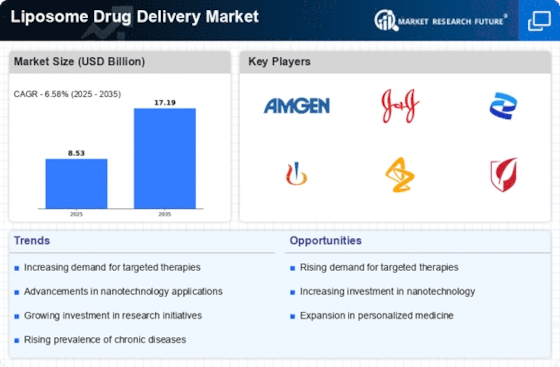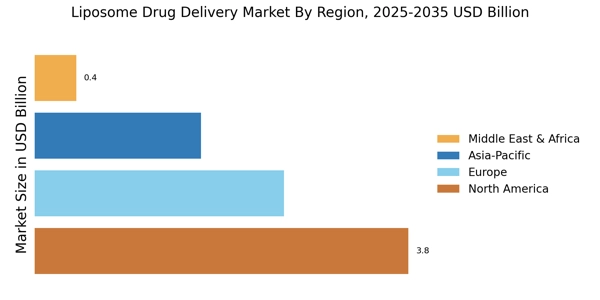Advancements in Nanotechnology
The integration of nanotechnology into drug delivery systems is transforming the Liposome Drug Delivery Market. Innovations in nanotechnology facilitate the development of more efficient liposomal formulations that can enhance drug stability, release profiles, and targeting capabilities. For instance, the ability to modify liposome surfaces with targeting ligands allows for selective delivery to diseased tissues, which is particularly beneficial in oncology. The market is witnessing a surge in research and development activities aimed at optimizing liposomal formulations, with investments in nanotechnology expected to reach billions in the next few years. This trend not only enhances the therapeutic efficacy of drugs but also positions liposomes as a cornerstone in the future of personalized medicine.
Rising Investment in Pharmaceutical R&D
The Liposome Drug Delivery Market is experiencing a boost due to increased investments in pharmaceutical research and development. Pharmaceutical companies are allocating substantial resources to explore novel drug delivery systems, including liposomal formulations, which are recognized for their potential to improve drug efficacy and safety. Recent data indicates that global pharmaceutical R&D spending has surpassed $200 billion annually, with a significant portion directed towards innovative delivery methods. This trend is likely to accelerate the development of new liposomal drugs, as companies seek to differentiate their products in a competitive market. The focus on R&D not only fosters innovation but also enhances the overall growth trajectory of the liposome drug delivery sector.
Increasing Prevalence of Chronic Diseases
The rising incidence of chronic diseases such as cancer, diabetes, and cardiovascular disorders is a pivotal driver for the Liposome Drug Delivery Market. As these conditions become more prevalent, the demand for effective and targeted drug delivery systems intensifies. Liposomes, known for their ability to encapsulate drugs and enhance bioavailability, are increasingly being utilized in therapeutic applications. According to recent estimates, the market for liposomal formulations is projected to grow significantly, with a compound annual growth rate (CAGR) of over 10% anticipated in the coming years. This growth is largely attributed to the need for innovative treatment options that can improve patient outcomes and minimize side effects, thereby reinforcing the importance of liposome technology in modern medicine.
Growing Awareness of Personalized Medicine
The shift towards personalized medicine is a crucial driver for the Liposome Drug Delivery Market. As healthcare evolves, there is an increasing emphasis on tailoring treatments to individual patient profiles, which aligns well with the capabilities of liposomal drug delivery systems. Liposomes can be engineered to deliver specific drugs based on genetic and molecular characteristics, thereby improving therapeutic outcomes. The market is witnessing a growing acceptance of personalized therapies, with projections indicating that the personalized medicine market could reach $2 trillion by 2030. This trend underscores the potential of liposomal formulations to play a vital role in the future of targeted therapies, enhancing their relevance in contemporary healthcare.
Regulatory Support for Innovative Drug Delivery Systems
Regulatory bodies are increasingly recognizing the importance of innovative drug delivery systems, which is positively impacting the Liposome Drug Delivery Market. Initiatives aimed at expediting the approval process for novel therapies, including liposomal formulations, are being implemented to encourage innovation. For instance, the FDA has introduced pathways for accelerated approval of drugs that demonstrate significant benefits over existing therapies. This regulatory support is likely to enhance the market landscape for liposomal drugs, as it encourages pharmaceutical companies to invest in the development of new formulations. The favorable regulatory environment not only facilitates quicker access to market but also promotes the advancement of liposome technology in therapeutic applications.

















